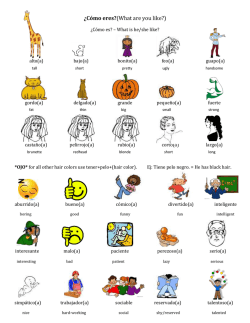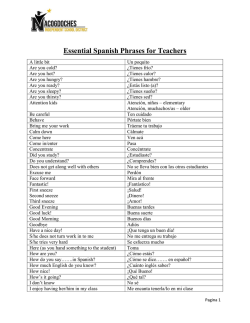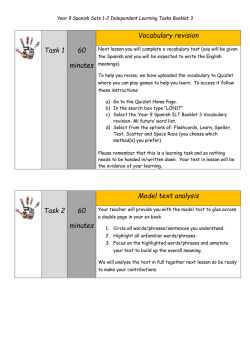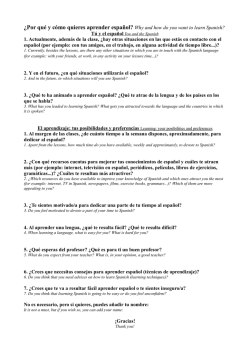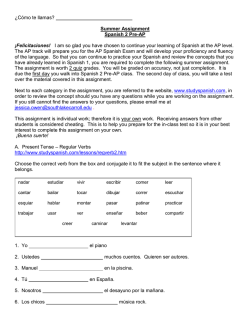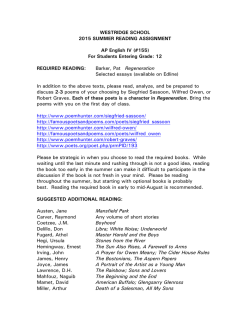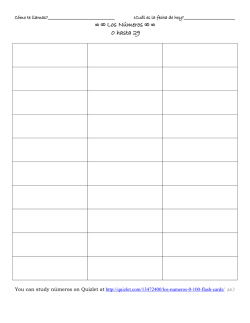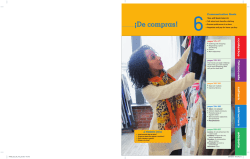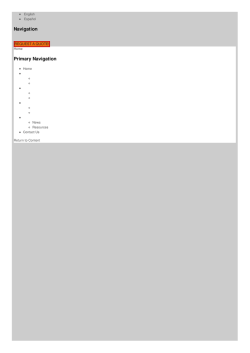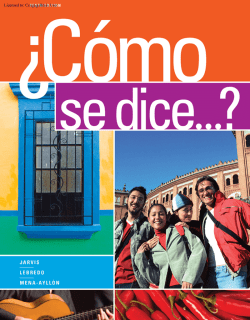
Nuestras leyendas
Print Lesson Plan C A P Í T U L O Menu 5 Nombre Clase Fecha Nuestras leyendas PRIMER PASO To express qualified agreement and disagreement, you’ll need to know various expressions. To report what others say and think, you should be able to use impersonal expressions with se. ASÍ SE DICE 1 For each set of expressions, write the one that doesn’t fit with the others. Claro que sí. ¡Qué va! ¡Qué tontería! 2. Por supuesto. Desde luego. ¡Qué tontería! ¿Tú crees? 3. ¡Al contrario! ¿Tú crees? Claro que no. ¡Nada de eso! 4. No sé. ¡Nada de eso! Puede ser, pero... Depende. 5. Depende. Eso es. Así es. ¡Cómo no! 6. ¡Cómo no! ¡Qué va! ¡Es muy difícil! Bueno, puede ser. 7. Así es. Desde luego. Bueno, puede ser. Here are the results of an opinion survey you sent out. Tally up the responses to determine whether the student body wants to buy a new school flag (bandera) or not. ¿Necesitamos de verdad una bandera? No sé; es muy difícil decidir. ¡Qué tontería gastar dinero en una bandera! ¡Qué va! ¿Una bandera? Desde luego. ¿Una bandera? ¡Por supuesto! ¡Cómo no! Estoy de acuerdo. ¡Buena idea! ¡Nada de banderas! ¿Una bandera? Hasta cierto punto, es necesaria, pero... A FAVOR 4 ✓ Comprar la bandera Holt Spanish 3 ¡Ven conmigo!, Chapter 5 Copyright © by Holt, Rinehart and Winston. All rights reserved. INDECISO (UNDECIDED) 2 EN CONTRA 3 No comprar la bandera Cuaderno de gramática, Teacher’s Edition 37 Primer paso ¡Qué va! 1. De acuerdo. CAPÍTULO 5 2 Expressing qualified agreement and disagreement Menu Lesson Plan Nombre Print Clase Fecha Nota G ramatical The impersonal se In a sentence about what people in general do, se can replace the subjects uno, la gente, ellos, etc. The verb usually becomes singular. Aquí uno trabaja mucho. ➔ Aquí se trabaja mucho. Muchos creen que el mundo es redondo. ➔ Se cree que el mundo es redondo. Antes, la gente lo pasaba bien leyendo. ➔ Antes, se lo pasaba bien leyendo. ¿Cómo dicen legend en español? ➔ ¿Cómo se dice legend en español? 3 Rewrite each of the following sentences about Belén’s school using the impersonal se. MODELO Muchas personas leen en la biblioteca. Se lee en la biblioteca. 1. La gente habla mucho español en la clase. CAPÍTULO 5 Primer paso Se habla mucho español en la clase. 2. Mucha gente usa computadoras en las clases. Se usa computadoras en las clases. 3. Las personas comen bien en la cafetería. Se come bien en la cafetería. 4. Muchos trabajan en los laboratorios de química. Se trabaja en los laboratorios de química. 5. La gente practica muchos deportes. Se practica muchos deportes. 4 Using se, write questions for the following contexts. MODELO where people go to take a walk ¿Adónde se va a dar un paseo? 1. how one gets to the pharmacy Answers will vary. Possible answers: ¿Cómo se llega a la farmacia? 2. what people do at a party ¿Qué se hace en una fiesta? 3. where people like to go to shop ¿Adónde se va a hacer compras? 4. why people exercise ¿Por qué se hace ejercicios? 5. why people save (ahorrar) money ¿Por qué se ahorra dinero? 38 Cuaderno de gramática, Teacher’s Edition Holt Spanish 3 ¡Ven conmigo!, Chapter 5 Copyright © by Holt, Rinehart and Winston. All rights reserved.
© Copyright 2026
